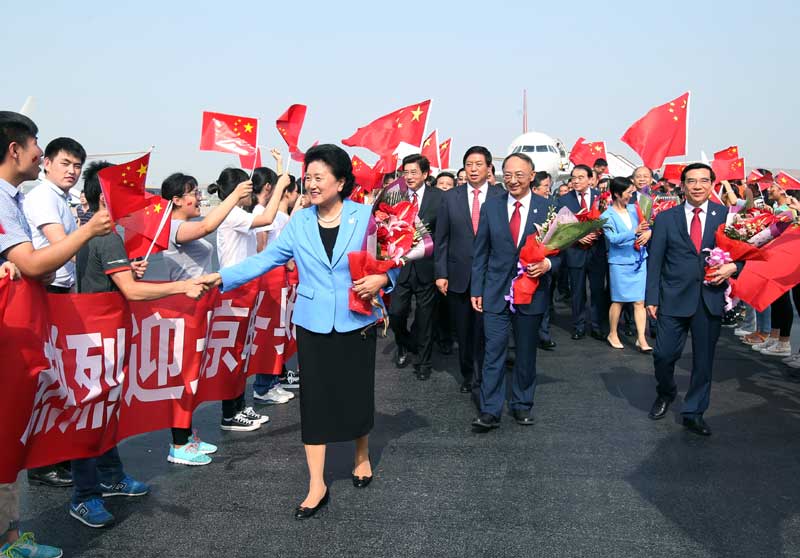Xinhua Insight: A wave of startups raises tide of entrepreneurship
BEIJING, July 20 (Xinhua) — Guo Xin, 23, an undergraduate at Nankai University, feels no pressure from China’s economic slowdown. Instead, he sees positive changes encouraging startups.
“The economy is facing great downward pressure, but for entrepreneurs, the business environment has never been better,” Guo told Xinhua.
Guo is CEO of a an Internet finance company and has established a start-up each year for the past three years.
Like Guo, hundreds of thousands of young Chinese have started their own companies or projects in the past year or two as a startup frenzy grips the nation. Partly thanks to serious reforms, especially business registration reform, it is easier than ever to start a business.
China is entering a new stage of slower but more resilient growth, which President Xi Jinping has called the “new normal.” The essence of the “new normal” is an improved economic structure that relies on services, consumption and innovation.
STARTUPS SHOOT UP
China’s GDP growth held steady at 7 percent in the first half this year, but another figure — the number of newly registered enterprises — is even more impressive. New registrations jumped 19.4 percent from a year ago to 2.1 million in H1.
“Creative, entrepreneurial spirit has been stoked by business reform,” said Yu Fachang with the state administration for industry and commerce (SAIC).
By the end of June, there were around 74.2 million businesses in China, including agricultural concerns and individual traders, up 7 percent from the end of 2014, SAIC data showed.
The number of new firms registered in the service sector accounted for 80.3 percent of the increase, or 1.6 million during the first six months, 22.6 percent more than in the same period last year.
This, Yu said, reflects a better economic structure, with the service sector playing its prescribed “bigger role” in growth and job creation. The sector has become the biggest driver of growth, expanding 8.4 percent in H1 and accounting for 49.5 percent of GDP.
Wang Bao’an, head of the National Bureau of Statistics, believes that a new wave of mass entrepreneurship and innovation is in the offing, given the huge success of many startups. The drive for mass entrepreneurship and innovation along with repeated cuts to red tape are feeding creativity and market vitality, Wang told the People’s Daily last week.
CONTINUOUS REVOLUTION
Premier Li Keqiang has repeatedly promised that the government will revolutionize itself to promote mass entrepreneurship and innovation.
In streamlining business registration since 2014, China has removed minimum capital requirements, replaced annual company inspections with a reporting system and loosened site requirements for businesses. Last month, the government announced that those wishing to start their own business would only need to apply to one office for the three essential business certificates, rather than the current regime of visits to three different offices. Business licenses, tax registration certificates and organization code certificates will all now be issued by the SAIC.
Guo Xin already feels the better business environment. “Entrepreneurship and innovation are state policies and there are many new government business incubators to assist new firms or projects,” he said, adding that other changes included easier financing, clearer procedures for starting a business, a much larger number of new entrepreneurs and an easier get-out processes for those who fail.
“Encouraging mass entrepreneurship and innovation has activated hundreds of thousands of cells in the market, which helped macroeconomic stabilization,” Premier Li told a conference earlier this month.
THE FOURTH WAVE
Economist Gu Shengzu believes that lowering the threshold for starting businesses, removing restrictions and the rise of the Internet economy may have created a “perfect storm” of entrepreneurship in China.
“Entrepreneurship and innovation are twins. To the Chinese economy, they mean not only a better today, but a better tomorrow and the day after tomorrow,” Gu told Xinhua.
The innovative power of the Chinese people is an important engine for stable growth and a smooth transition to the new normal, he said, calling this “the fourth wave” of mass entrepreneurship in nearly 40 years.
The first wave began in 1978 when reform and opening-up began, with farmers setting up township enterprises and urban dwellers starting small businesses. The second wave swept China after 1992, with about 100,000 public servants resigning from their “jobs for life” to go into business for themselves. The third came when China joined the World Trade Organization in 2001.
The past three waves gave rise to numerous top Chinese entrepreneurs who rose from nobodies to tycoons, including Alibaba founder Jack Ma, Tencent’s Pony Ma and smartphone manufacturer Xiaomi’s CEO Lei Jun.
Gu said the difference between the first three waves and this fourth wave is that the government has actively worked to bring about the arrival of the fourth through aggressive policies.
Wang Bao’an, the statistics chief, wants future reform to focus on four areas: price controls, market entry, R&D and invigorating State-owned firms. He maintains that only more reforms will guarantee future growth. “The policy goals of stabilizing growth, restructuring the economy and achieving innovation-driven growth can be reached only through more reform… The key is to leave the market to allocate resources,” he said. Enditem























